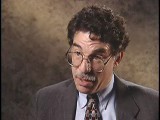You searched for: ������������������������������what���aptao168���volk
<< Previous | Displaying results 501-510 of 683 for "������������������������������what���aptao168���volk" | Next >>
-
Hana Mueller Bruml recalls the occupation of Prague
Oral HistoryIn 1942, Hana was confined with other Jews to the Theresienstadt ghetto, where she worked as a nurse. There, amid epidemics and poverty, residents held operas, debates, and poetry readings. In 1944, she was deported to Auschwitz. After a month there, she was sent to Sackisch, a Gross-Rosen subcamp, where she made airplane parts at forced labor. She was liberated in May 1945.
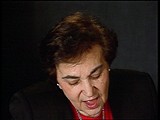
-
Joseph Maier describes Hermann Göring at Nuremberg
Oral HistoryJoseph immigrated to the United States in 1933 after finishing university in Leipzig. His parents and brother had left Germany earlier for the United States. Joseph attended Columbia University. From 1940 to 1943 he was assistant editor for a New York German-Jewish newspaper. In 1944, he worked in the American embassy in Britain as a propaganda analyst. He went to Nuremberg, Germany, as an interpreter in 1946. He analyzed materials and transcripts, and participated in many interrogations for the Nuremberg…
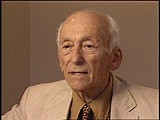
-
Joseph Maier describes former Auschwitz commandant Rudolf Hoess at the Nuremberg trial
Oral HistoryJoseph immigrated to the United States in 1933 after finishing university in Leipzig. His parents and brother had left Germany earlier for the United States. Joseph attended Columbia University. From 1940 to 1943 he was assistant editor for a New York German-Jewish newspaper. In 1944, he worked in the American embassy in Britain as a propaganda analyst. He went to Nuremberg, Germany, as an interpreter in 1946. He analyzed materials and transcripts, and participated in many interrogations for the Nuremberg…
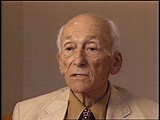
-
Einsatzgruppen massacre sites in Ukraine and surrounding areas
MapIn the summer of 1941, following Germany's attack on the Soviet Union, the Germans began to perpetrate mass shootings of Jewish men, women, and children in territory seized from Soviet forces. These murders were part of the “Final Solution to the Jewish Question,” the mass murder of Europe’s Jews. Many of these mass shootings were organized and committed by task forces or special action groups, called Einsatzgruppen in German. Units of Einsatzgruppen followed the German army as it invaded the Soviet…

-
Olympic athlete John Woodruff describes his experiences of discrimination
Oral HistoryIn 1936, John Woodruff was one of 18 African Americans on the US Olympic team competing in Berlin. He won the gold medal for the men's 800-meter race. In this clip from an interview on May 15, 1996, Woodruff describes his personal experiences of racial discrimination during and after the Olympic Games of 1936.
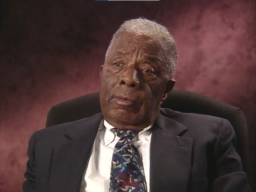
-
Leon Bass describes his wartime experiences
Oral HistoryLeon Bass was born in Philadelphia, PA in 1925. He joined the US Army in 1943 and served as a member of the all-Black 183rd Engineer Combat Battalion attached to General Patton's Third Army. Leon's unit was involved in the Battle of the Bulge as well as the liberation of Buchenwald. After the war, Leon went on to receive his doctorate, teach, and speak about the Holocaust and racism. In this interview, Leon describes his first experiences with the realities of war and death. He reflects upon his…
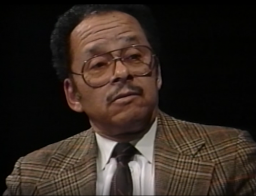
-
Leon Bass describes his knowledge of Nazi camps during and after World War II
Oral HistoryLeon Bass was born in Philadelphia, PA in 1925. He joined the US Army in 1943 and served as a member of the all-Black 183rd Engineer Combat Battalion attached to General Patton's Third Army. Leon's unit was involved in the Battle of the Bulge as well as the liberation of Buchenwald. After the war, Leon went on to receive his doctorate, teach, and speak about the Holocaust and racism. In this interview, Leon describes what he knew about Nazi concentration camps and the Holocaust during and after…
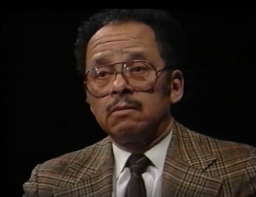
-
Sally Pitluk describes forced labor in Budy
Oral HistorySally Pitluk was born to Jewish parents in Płońsk, Poland in 1922. A few days after the German invasion of Poland in 1939, Płońsk was occupied. Sally and her family lived in a ghetto from 1940-1942. In October of 1942, Sally was transported to Auschwitz, where she was tattooed and moved into the subcamp Budy for forced labor. She stayed in the Auschwitz camp complex until the beginning of 1945 when she and other prisoners were death marched to several different camps. She was liberated in 1945 and…
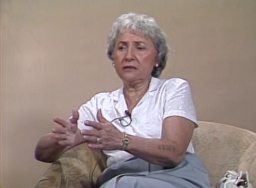
-
Historian Peter Black describes the impact of a statement made by a former camp guard
Oral HistoryIn the 1980s and 1990s, historian Peter Black worked for the US Department of Justice Office of Special Investigations, as part of a team tracking and prosecuting suspected war criminals. Black later served as the Senior Historian at the United States Holocaust Memorial Museum.
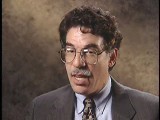
-
Historian Peter Black describes need for improvement in world responses to atrocities
Oral HistoryIn the 1980s and 1990s, historian Peter Black worked for the US Department of Justice Office of Special Investigations, as part of a team tracking and prosecuting suspected war criminals. Black later served as the Senior Historian at the United States Holocaust Memorial Museum.
